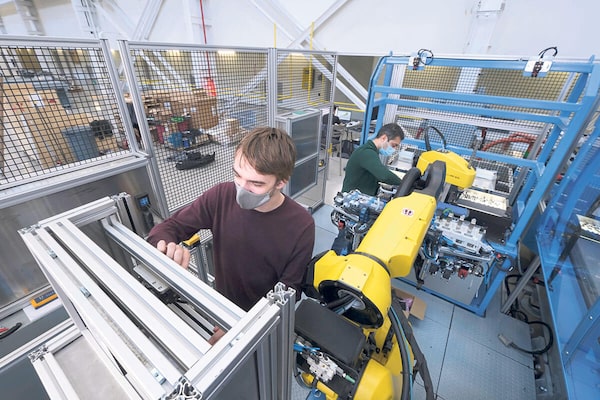
Jared Bergsma (front), a research associate for Georgian College’s Research and Innovation department and Mechanical Engineering Technology graduate, and Amir Baghaki, Mechanical Engineering faculty at Georgian College, joined Mechanical Engineering faculty in a project to design and build a complete robotic system that automates every stage of production for an advanced injection mould acquired by Molded Precision Components (MPC).DOUG CRAWFORD/GEORGIAN COLLEGE
By the time he started the third semester of the mechanical engineering technology program at Georgian College in Barrie, Ontario, Jared Bergsma had a solid grasp of such concepts as fluid mechanics, computer-aided design and machine shop workflow.
So when the school’s research and innovation department presented an opportunity to apply these concepts – and learn some new ones – in a real-world industrial project that called for out-of-the-box thinking, Mr. Bergsma quickly put up his hand and asked to join the project.
“The idea of getting a lot of hands-on experience really appealed to me,” says Mr. Bergsma, who graduated this past August from Georgian, whose network of seven campuses extends from Owen Sound and Orangeville in northwestern Ontario to cottage country in Muskoka. “And knowing that this was going to be a challenging project – that was very exciting to me.”
The project – a partnership between Georgian and Molded Precision Components (MPC) in Oro-Medonte, just east of Barrie – was a proof-of-concept project that called for the design and creation of a complete robotic system that would automate every stage of production for an advanced injection mould acquired last year by MPC. The manufacturer has plans to invest in more of these injection moulding machines, and this pilot system will de-risk scale-up of the technology for future systems.
This meant the entire manufacturing process, from inserting the raw material into the mould through to retrieval, inspection and packaging, would be handled by pre-programmed, state-of-the-art machines within an integrated system known as a robot cell.
“This was a very big project with a lot of equipment and a lot of different stages that had to be designed and problem-solved,” says Amir Baghaki, a mechanical engineering faculty member who was tasked with leading the project. “In partnership with MPC, we started with their initial concept, and together we have been able to complete the design and manufacturing of the cell. We are currently in the integration stage.”
Six students signed up for the project, which launched this past January. Working under Mr. Baghaki’s supervision, the students tackled a host of challenges, such as how to ensure the system could be adapted easily to design changes.
“As we were making the cell, we were also predicting the features to be added in the future, such as extra cameras to improve the vision system,” recalls Mr. Bergsma.
There was also the challenge of the pandemic. To ensure the team could continue to work safely, the township of Oro-Medonte made an old, cavernous fire hall available, into which the project was moved.
By October, the team had designed, built and assembled the robot cell, which consists of three robots working side by side in a production line that runs almost 10 metres long, or half the length of a 10-pin bowling lane.
Laleh Khodaparast, project manager, Research and Innovation at Georgian, cites the MPC project as another example of the college’s commitment to innovative partnerships with industry.
“By acting as a bridge between the college and industry, our department helps our students get the hands-on experience and strong creative-thinking skills they need to succeed in their careers,” she says. “When I see our students being hired by industry partners we’ve worked with, I know we’re doing a good job.”
Produced by Randall Anthony Communications. The Globe’s editorial department was not involved in its creation.